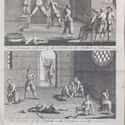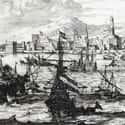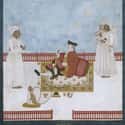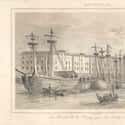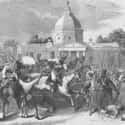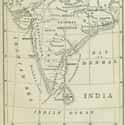-
(#2) The EIC Used Propaganda To Justify Conflicts With The Dutch
The "big three" in terms of exploration during the early 17th century - England, the Netherlands, and Portugal - competed heavily for land, trade rights, wealth and power. The Portuguese fell by the wayside pretty early on, which left the main rivalry between the East India Company of the British and the Dutch United East Indies Company (Vereenigde Oost-Indische Compagnie in Dutch, or VOC) to heat up quickly. The EIC and VOC engaged in military skirmishes - something both were empowered to do, given their mandates - but the war of words was just as vicious.
As part of this, the British, who were falling behind in the spice trade in the region, kicked off a propaganda campaign that destroyed the reputation of the Dutch in England and throughout Europe. In the 1630s, British pamphlets alleged horrible atrocities, described acts of extreme brutality, and contained images aimed at enraging the public.
In 1652, after England passed the Navigation Act meant to give the British an upper hand on sea trade, Oliver Cromwell ordered the pamphlet reprinted to justify going to war with the Dutch. The First Anglo-Dutch War, the first of four that took place during the 17th and 18th centuries, helped establish the dominance of the EIC in maritime commercial trade and imperial dominance.
-
(#1) The EIC Reportedly Offered The Sultan Of Achin A British Virgin For His Harem
As the British sought to out-explore and out-control other European countries, the East India Company used any means necessary to influence, control, and compel the governments they met to trade with them. In the early years of the 17th century, merchants from the EIC were purported to have offered the Sultan of Achin on the island of Sumatra a British virgin for his harem. King James I reportedly stepped in and stopped the exchange before it could happen, however.
-
(#5) The EIC Financially Crippled Existing Governments In India
After the Battle of Buxar on October 22, 1764, the British and the Mughal Emperor Shah Alam II signed the Treaty of Allabahad. The agreement gave the British rights to collect taxes on behalf of the Mughals - whom they were not protecting, according to the treaty - and basically set up British rule in the eastern province of India. The British paid a small sum to the Mughals but took most of the money for themselves.
Another part of the treaty required the Nawab of Awadh to pay millions of rupees in war indemnity, a sum they were unable to maintain, and by 1801, the British took control of the northern part of India as well.
-
(#6) Corruption And Brutality Within The EIC Was So Extensive That Parliament Intervened - Repeatedly
During the 1770s, the British government became increasingly frustrated with the corruption and mismanagement of the EIC. They implemented laws that gave the company regulated loans in exchange for authority over the EIC's territory. In 1784 and again in 1786, the British government passed additional laws giving themselves control over EIC appointments of officials and personnel.
In Parliamentary hearings about the EIC, Major Henry Munro testified about British efforts in India. According to his 1772 statement, conditions in India were tense and rebellions were common. Munro recounted one particular revolt from 1764 when rebellious sepoys, or native troops, were marched out in front of British troops, tied to cannons, and "blown away."
-
(#13) The EIC Finally Went Too Far In 1857
The Sepoy Mutiny of 1857 brought out the worst in the EIC and ultimately led to its liquidation. Indian troops, or sepoys, that were in the service of the EIC revolted for a variety of reasons, including years of oppression and exploitation by the British. The immediate cause, however, was based in the type of rifle and ammunition cartridge the sepoys were required to use in 1857. The cartridges were coated in animal fat and contact with such a product was against both Hindu and Muslim law.
In the spring of 1857, open rebellion when sepoy troops attacked their British counterparts in and seized Delhi. Indians soon began attacking European men, women, and children and the revolt spread to three Indian provinces. The revolt continued for a year until July 1858 when peace was declared.
The brutal response by the EIC resulted in the deaths of hundreds of sepoys and other Indians. Sepoys were bayonetted or shot from cannons, and after the British retook Delhi in 1857, the Mughal emperor's sons and grandson were executed in cold blood before the emperor was sent into exile.
With long-standing criticisms of the EIC, this was Parliament's excuse to intervene once and for all and dismantle the company. The brutality and chaos on both sides of the revolt prompted the British government to take direct control of India in 1858. In 1873, the EIC legally ceased to exist.
-
(#10) The EIC's Continued Use Of Torture Led To An Official Investigation And The 'Madras Torture Report'
In the 1850s, Parliament called for the EIC to conduct an investigation into the widespread and horrific claims of torture by people in India. The Madras Native Association petitioned the British Parliament and, when word of the atrocities hit the British and Indian press, calls for increased control of the EIC ensued.
The investigation led to a public document that is known as the Madras Torture Report.
New Random Displays Display All By Ranking
About This Tool
On December 31, 1600, Queen Elizabeth I of England granted BEIC a royal license granting it the privilege of trading in India. In fact, this license permits the East India Company to monopolize trading rights in India for 21 years. Over time, the East India Company established British India, from a commercial trading enterprise to the actual master of India.
In 1670, the East India Company gained more authority, with the rights to mint coins, command fortresses and troops, form alliances and declare war, and sign peace treaties. At this time, the East India Company actually had the function of a country and became the pioneer of the British Kingdom's colonization of the East. The random tool shares 13 worst things the Honourable East India Company ever did.
Our data comes from Ranker, If you want to participate in the ranking of items displayed on this page, please click here.











